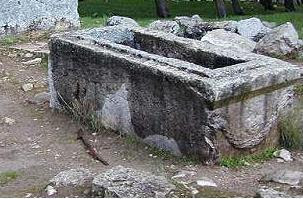 |
| Art by Walfrido |
Rabbi Bachya Ibn Pakuda wrote his classic book Chovot HaLevavot in Arabic in the year 4921 (1161), in Spain. It was translated into Hebrew by Rabbi Yehudah ben Tivon. The following is from Lev Tov, an adaptation of the Hebrew text into a simpler style:
Said the Soul: Teach me the secret, what was the purpose of my formation? What was Hashem's intention in bringing my neshama, Divine soul, into this world? Which activities am I forced to do and which ones can I choose to do or not? I do not want to be like that King who did not know what was good for him. And this is his story:
On a small island in the Indian ocean, the inhabitants decided that every year they would take a stranger and make him the king. After the year was over they would strip him of everything he had and send him away, and he would return to the status he had before he came.
One year they chose a fool who knew nothing about what would happen to him after the year was up. He built palaces and hoarded a fortune, and fortified the island, but sent nothing home from the island. On the contrary, he brought his property, his wife, and his children to the island.
When the year was finished the islanders sent him away empty-handed, seizing everything he had built and possessed before and after his arrival. He greatly regretted the work and effort that he had put into building and amassing a fortune, all of which passed to someone else's hands.
Afterwards, the islanders selected a wise and understanding man. Once he was crowned, he made friends with one of the islanders and showered him with favours. He then asked him what had happened to the previous king. This man revealed the secret to the king. Once he knew the secret, he did not follow the previous king's example at all. He put all his effort into exporting as many valuables as he could from the island to his home, and there he amassed wealth.
He was not affected by the honour accorded to him by the islanders. The whole time he was among them he had mixed feelings of grief and joy. On the one hand he was grieved when he realized he would be banished shortly, and the treasures he had succeeded in exporting were, in his estimation, few. If he could only stay longer, he would have been able to bring out much more.
On the other hand, he was glad that he would soon leave the island and live at home where he had many treasures waiting for him, and he could enjoy them continually with peace of mind and security.
And after his year was up, he was not upset about leaving. On the contrary, he was quick to do so with joy and desire, taking pleasure in his work and effort. He was going to have a good future, honour, and constant happiness. He was happy about the time he spent on the island, and was joyous in the period after he left. He achieved success in both places.
Said the Soul: This is the story I heard, and I'm afraid that what happened to the foolish ruler will happen to me. He lost everything he had in both places. Since G-d gave you to me to be my advisor, please teach me about my status. What do you know about the secret of my coming into this world and how to use it for my benefit?
The Intellect answered: In the story you related, you have already given a picture of your situation in the world, which resembles the situation of the two kings you mentioned. You clearly realise that you are a stranger here and will soon depart from this world. Therefore, you should act as the wise and understanding king, and act in this world the way he did on the island. If you will do otherwise, my words will be of no use to you, my fine language will not bring you any benefit.
The secret of your existence is that the Creator created you out of nothing along with all the spiritual beings He created. His purpose is to exalt you and raise your spiritual level to the high degree of His beloved, pure, chosen ones, who are nearest to the light of His glory. He does so for your good and out of His loving kindness towards you.
But you will only be worthy of this after the Creator has prepared you with three conditions:
1) He removes the curtain of foolishness from you and enlightens you with His wisdom
2) You are tried and tested as to whether you will choose His service or rebel against Him
3) He disciplines you in this world with the yoke of His service.
Source: "King for a Moment" by B. D. Kvutzat

























